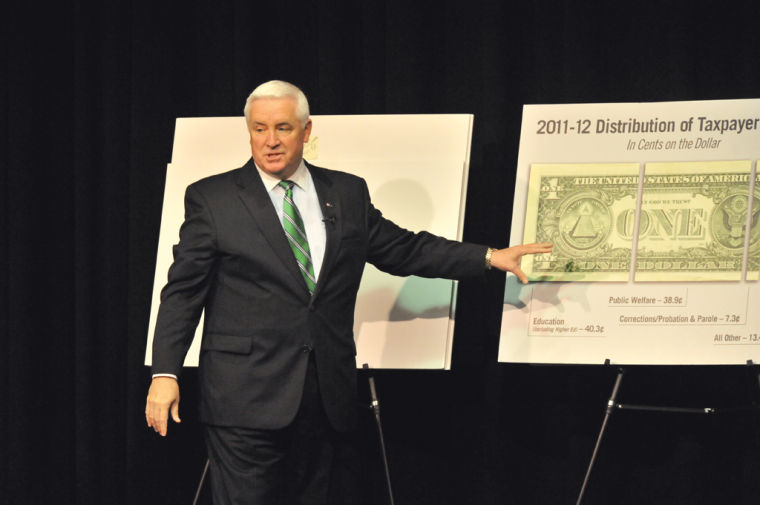Corbett proposes budget
February 6, 2013
For the first time during Gov. Tom Corbett’s term in office, Pitt has escaped from the governor’s annual budget address unscathed.
During his address, which began at noon before a joint session of the House and Senate on the House floor at the Capitol, Corbett confirmed that he has not proposed any cuts to higher education in this year’s budget. The governor first announced his intention to retain flat funding for state and state-related universities this year on Feb. 1. Pitt, Penn State, Temple and Lincoln are the four Pennsylvania schools that are considered state-related universities.
Higher education
The new proposed budget appropriates $136 million to Pitt for the 2013-2014 fiscal year — the same amount Pitt received last year. Corbett’s proposed budget amounts to a total of $28.4 billion, an increase from the $27.4 billion he proposed last year.
“We intend to maintain full funding levels for state and state-related universities. That is $1.58 billion that will go toward these institutions,” Corbett said before members of both the Pennsylvania House and Senate.
The confirmation of flat funding comes on the heels of an agreement between the governor and the state-related universities — in exchange for avoiding the appropriations ax, the universities will work to keep tuition costs “as low as possible” for students.
“Our commitment allows schools to plan their budgets for the coming year and make the best use of their resources. Their commitment should allow students and their families to plan their own budgets,” Corbett said.
Corbett added a note on the motive behind his proposed flat funding to Pitt and its fellow state-related schools.
“Our message to college students today is that both my administration and the leaders of your state and state-related schools are committed to making the dream of higher education attainable,” he said.
Pitt Vice Chancellor Robert Hill said that the University is not ready to comment on the governor’s proposed budget.
“The University will assess the budget message before issuing further comment by the chancellor,” Hill said, adding that Chancellor Mark Nordenberg will testify in Harrisburg, Pa., on Feb. 25 and 28 at the House Appropriations Committee and Senate Appropriations Committee, respectively.
However, at a press conference with Corbett on Feb. 1, Nordenberg responded to the proposed flat funding by recognizing that the agreement between the state and universities was in line with recommendations from the governor’s Commission on Postsecondary Education. The commission, on which Nordenberg serves, was created by Corbett following last year’s proposed hefty cuts to discover ways to improve higher education in Pennsylvania.
“The governor then has taken the first step. He is moving us forward, consistent with the report of the commission,” Nordenberg said.
Prior to Corbett taking office in 2011, Pitt had received increased funding every year between 2007 and 2009 and flat funding in 2010. In 2011, Pitt received a 19 percent cut to its previous allocation of $168 million, bringing the University to its current allocation level of $136 million.
Though proposed flat funding represents an improvement in Pitt’s state-appropriation prospects from 2011 — when Corbett recommended a 50 percent cut to Pitt’s appropriations — and 2012 — when the University faced a 30 percent cut — flat funding still increases the odds of a tuition increase for the 2013-2014 academic year.
Last year, the Pennsylvania Legislature rolled back Corbett’s proposed 30 percent cut to Pitt in favor of flat funding, but the $136 million Pitt received still resulted in a 3 percent tuition hike due to inflation.
Hill said the University is not yet ready to comment on a potential tuition increase.
“While the University remains, as always, committed to keeping tuition as low as possible, full consideration of tuition occurs after the Commonwealth appropriation to Pitt is law,” he said.
One week from today, hundreds of Pitt students are expected to travel to the state Capitol for Pitt Day in Harrisburg, an event at which students lobby legislators in regard to funding higher education.
Hill noted before the governor’s address that, given the proposed flat funding, the focus of Pitt Day in Harrisburg will shift from preventing cuts to encouraging an increase in funding.
“Advocacy efforts, including Pitt Day in Harrisburg, will center around increased funding if flat funding is proposed and if the Commonwealth receives greater revenue than projected,” Hill said.
The remainder of the address
In addition to higher education, Corbett also touched upon the state’s pension crisis, a plan to uncap the state’s wholesale gasoline tax and funding for public education in his budget address.
Corbett took a hard line on reducing pensions for state and public-school employees in his speech.
“The entire system of state pensions has become a mountain of debt, and the avalanche could bury our economic growth, swallow up benefits for our elderly, education for our children and transportation for our economy,” Corbett said. “Resolving our pension crisis will be the single most important thing we do for decades to come.”
The cost of state pensions is expected to increase by $403.1 million this year for a total of $1.26 billion if no action is taken. The state currently employs 300,000 employees and public school teachers.
Corbett proposed the creation of “a new 401k-style retirement benefit for our future employees, consistent with the retirement packages currently enjoyed almost universally by private-sector employees,” as a solution to the pension problem, along with a change in the way benefits are calculated for current employees.
The governor assured his audience that he will not cut benefits for those already retired or “allow any pension dollars already earned by any current employee to be diminished in any way.”
As expected, Corbett reiterated his commitment to use revenues gained from privatizing the state liquor stores as a means of funding education. The governor estimated that selling the currently state-run liquor stores to private owners will open up $1 billion dollars in block grant funding for education.
“Selling liquor is not a core function of government — education is. We need to put our liquor system into private hands,” Corbett said. “Pennsylvanians have waited too long for the day they could buy beer or wine at the grocery store or choose from a greater variety of offerings at privately owned liquor stores.”
Corbett also addressed the issue of Medicaid expansion in his speech. The federal government has said it will cover the cost of expanding Medicaid in each state until 2020, after which it will cover 90 percent of the cost.
Corbett expressed skepticism for the idea of expanding Medicaid, calling expansion a plan “without any clear guidance or reasonable assurances.”
“Washington must provide a clear answer about what this expansion would cost the taxpayers of our state,” Corbett said. “At this time, without serious reforms, it would be financially unsustainable for the taxpayers, and I cannot recommend a dramatic Medicaid expansion.”
The governor also unveiled a more detailed picture of his plan to uncap a state tax paid by oil and gas companies on the wholesale price of gasoline. The tax is currently capped at $1.25 per gallon. By removing the cap, the governor said he believes that the state can open up approximately $2 billion in funding for transportation. But the change could result in increased gasoline prices in the state.
“This is not a new tax, nor am I proposing to increase the rate of the existing tax,” Corbett said. “I am simply saying the time has come to apply it to the full value of what the company is selling. It is time for oil and gas companies to pay their fair share of the cost of the infrastructure supporting their industry.”
After two years of drastic cuts, this year’s budget proposal saw less belt-tightening, most notably as a result of the governor’s recommendation to eliminate 900 government positions.
In the coming months, the governor, House and Senate will work together to negotiate different funding points and adjust the budget. The governor is expected to sign a final version of the budget by July 1 when the 2013-2014 fiscal year begins.








